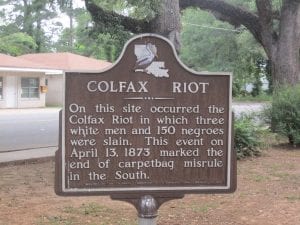Redemption and the Civil War
Redemption: The Last Battle of the Civil War – Nicholas Lemann
Redemption – “the act of making something better or more acceptable”

The dictionary definition of redemption seems pretty self-explanatory, but how about redemption in relation to the Civil War? A book I read recently dealt with this concept in terms of what happened once the war “ended.” Yes, the quotes around “ended” are deliberate because, after reading this book, I questioned whether or not the war ended in 1865 with Lee’s surrender to Grant in the Appomattox courthouse. After reading this book, it would seem that the war continued on — but in a different and crueler way.
This cruelty can be seen in Colfax, Louisiana, which was the site of what became known as the Colfax Riot. I bet when you first read the name nothing came to mind – which happened to me. It holds significance that cannot be overlooked or forgotten, but most people have no idea what happened. As the picture included shows, the riot is commemorated by a sign that reads, “On this site occurred the Colfax Riot in which three white men and 150 negroes were slain. This event on April 13, 1873 marked the end of carpetbag misrule in the South.”
Yikes. The simplicity with which this even is remembered is kind of shocking — even more so once the whole situation is known. On Easter Sunday 1873, eight years after the “end” of the Civil War, a riot broke out in which politics was the main culprit again. Voting was the actual issue, but underneath lay the tensions that caused it all. After 1865, with the “end” of the war and the ratification of the 13th, 14th, and 15th amendments, slavery was abolished and voting rights were given to all men. On the surface, this seemed to solve the problem, but it did not. The inherent racism that was carried out by many White Americans continued, and they simply found other ways to oppress Black men and women.
The Colfax Riot was a prime example of this because it showed the corruption that ensued even after the creation of those amendments. The election for governor of Louisiana was contentious because White, Southern Democrats created shadow governments behind those that were legally in place and created an institution called the White League. Members of this group intimidated and attacked Republicans in the South, as well as Black citizens. The tensions came to a head with the election of governor. Requests were sent to Washington when it became obvious that the White League was going to show no mercy and eventually almost all Blacks that were part of the riot were murdered.
President Grant was contacted, but he did not send troops, and that worried Black residents of the Southern states. The political Civil War had ended, but the social Civil War was still raging on in the South. But, in a way, that was less overt. Many White southerners used intimidation, as seen in Colfax, and eventually loopholes that allowed them to continue to suppress members of the Black population — without technically breaking the law. Redemption then becomes another battle for Black residents, and one that is necessary for their safety in the free country they called home. They did not feel like redemption was being worked toward, and nothing was getting better for them. If anything, their lives were getting worse.
Abby Norberg
References
Definition: http://www.merriam-webster.com/dictionary/redemption
Picture: https://upload.wikimedia.org/wikipedia/commons/5/53/Colfax_Riot_sign_IMG_2401.JPG





